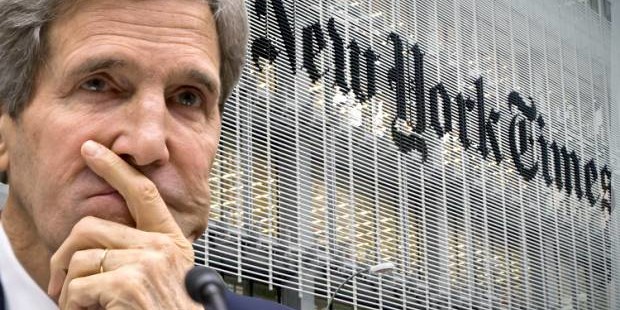
Propaganda and nonsense: Even more New York Times hypocrisy
What the New York Times and John Kerry pretend to forget is the real history of America’s noxious role in the world
“You just don’t in the 21st century behave in 19th century fashion by invading another country on a completely trumped-up pretext.” Thus spoke Secretary of State John Kerry on NBC’s “Meet the Press” last Sunday, just as Russia took control of Crimea in the latest escalation of the Ukraine crisis.
This extraordinary remark appears to have gone briefly viral. And surely I am not alone in requiring time to recover from the sheer ignorance and presumption of it. Ignorant because even by the standards at State, where the past must evaporate on an almost daily basis, it is hypocrisy unlimited on the very face of it. Presumptuous because it implies a degree of stupidity among us that not even P.T. Barnum would dare take for granted.
We have before us a full-dress campaign to persuade the world that Russian President Vladimir Putin’s military advances into Ukraine this week come as an unwarranted intrusion into the affairs of a nation struggling to find its way to a remade polity on the model of the liberal Western democracies. This is the explicit part. Implicit are the clean hands of American and European policy cliques and the broad approval enjoyed by the provisional government that appointed itself after President Viktor Yanukovych was hounded across the border with Russia two weeks ago.
This is the Good Housekeeping perspective on Ukraine. Kerry’s silly remark last weekend is one among countless in the service of this wholesale rewrite of events.
The unapproved perspective is far more interesting and should be recognized for what it is. For the second time in less than a year we witness an American intervention that, in the age of social media and all the rest, is transparent such that we can actually study it in real time. This is new. In the old days — when Washington undermined Mossadegh in Iran, say, or Arbenz in Guatemala, or even Allende much later in Chile — we had to wait years before the truth was unearthed beneath the macadam road of propaganda and lies laid quickly atop it at the time of events.
I should clarify. The first such occasion was last July, when the New York Times, in what was apparently deemed a one-off slip, provided a record of the telephone call Susan Rice, President Obama’s national security adviser, made to Cairo advising that the generals could go forward with the plan to depose President Mohammed Morsi. Morsi toppled within hours of the exchange.
And to clarify further, a third such occasion may shortly be upon us. This one, if it comes, will be in Venezuela, now ablaze with violent protests. Watch this space and know what you are watching: If the Maduro government in Caracas falls, it will mark the culmination of yet another American intervention.
This makes two, and maybe three, “19th century things” Americans insist upon doing in the 21st century. Not counting Iraq, Afghanistan and threats of violence elsewhere, of course. Please speak into the microphone, Mr. Secretary.
Here is the strange part, or one of many oddities, I ought to say. In all three cases we are offered what evidence of the truth cannot be avoided, and then it is quickly dispatched to oblivion by those laying down the macadam.
In the Egypt case, the Times recounted the Rice telephone call and seemingly never again mentioned it. All it has since written amounts to a game of pretend.
In the Venezuela case, William Neuman, the Times’ man in Caracas (and an intellectually dishonest ideologue), recounted the press conference when the Venezuelan foreign minister read aloud the email traffic revealing the covert American campaign to recruit students to the anti-Maduro cause. And then: Never again did he note it in his accounts of a supposedly spontaneous movement for the neoliberal democracy desired by everyone in the world, Ukrainians, too.
In Ukraine, we have the Victoria Nuland, “F the EU” tape, of course. This is the strangest of all. Amid all the tumult of the past couple of weeks, as the very people Nuland and her ambassador in Kiev were cultivating rose to the top, not a single mention of the tape and the red-handed evidence of American malfeasance. The coverage is all about the unjust intimidations of the Russian Bear, the silent, beady-eyed Putin being the perfect personification of the beast.
The media performance gives so astonishing an appearance of conspiracy at this point that you start to wonder if these people, correspondents and editors alike, are somehow getting dressed in the same locker room every morning. Please use the comment box if you can otherwise explain why not one correspondent finds it useful to cite prima facie evidence of American provocation on Putin’s doorstep.

